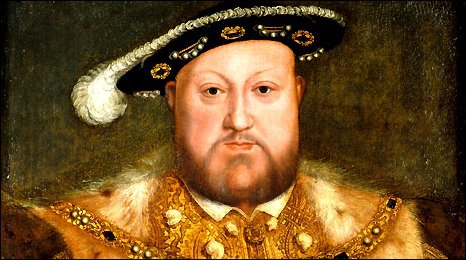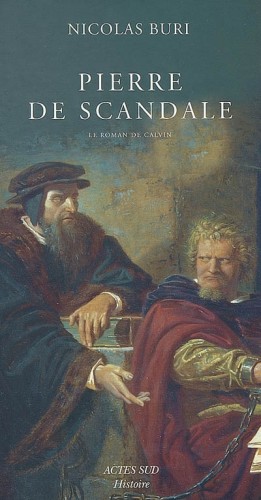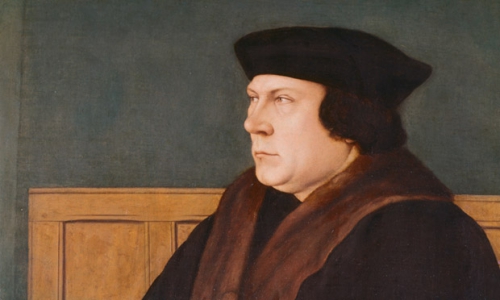lundi, 26 janvier 2015
Thomas Cromwell was the Islamic State of his day
On July 24, 2014, worshippers in Mosul were asked to leave one of the city’s most historic and famous buildings — an ancient Nestorian-Assyrian church that had long ago been converted into the Mosque of the Prophet Younis (biblical Jonah). The Islamic State then rigged the entire building with explosives, and blew it into oblivion. Tragically, it was a Shia mosque - one of many that have suffered the same fate.
The UK's current primetime TV fantasy blockbuster du jour is Wolf Hall. Everyone loves a costume drama, but there is a world of difference between fictional history and historical fiction. One dramatizes real people and events. The other is an entirely made-up story set in the past. The current tendency is to blur the two, which Wolf Hall does spectacularly.
Thomas Cromwell, whose life it chronicles, comes across as a plucky, self-made Englishman, whose quiet reserve suggests inner strength and personal nobility. Back in the real world, Cromwell was a “ruffian” (in his own words) turned sectarian extremist, whose religious vandalism bears striking comparison with the iconoclasm of Islamic State or the Afghani Taliban.
Thanks to Wolf Hall, more people have now heard of Thomas Cromwell, and this is a good thing. But underneath its fictionalized portrayal of Henry VIII’s chief enforcer, there is a historical man, and he is one whose record for murder, looting, and destruction ought to have us apoplectic with rage, not reaching for the popcorn.
Historians rarely agree on details, so a lot about Cromwell’s inner life is still up for debate. But it is a truly tough job finding anything heroic in the man’s legacy of brutality and naked ambition.
Against a backdrop of Henry VIII’s marital strife, the pathologically ambitious Cromwell single-handedly masterminded the break with Rome in order to hand Henry the Church, with its all-important control of divorce and marriage. There were, to be sure, small pockets of Protestantism in England at the time, but any attempt to cast Cromwell’s despotic actions as sincere theological reform are hopeless. Cromwell himself had minimal truck with religious belief. He loved politics, money, and power, and the reformers could give them to him.
Flushed with the success of engineering Henry’s divorce from Catherine of Aragon and his marriage to Anne Boleyn, Cromwell moved on to confiscating the Church’s money. Before long, he was dissolving monasteries as fast as he could, which meant seizing anything that was not nailed down and keeping it for himself, for Henry, and for their circle of friends. It was the biggest land-grab and asset-strip in English history, and Cromwell sat at the centre of the operation, at the heart of a widely-loathed, absolutist, and tyrannical regime. When Anne Boleyn pointed out that the money should be going to charity or good works, he fitted her up on charges of adultery, and watched as she was beheaded.
As an adviser to Henry, Cromwell could have attempted to guide the hot-headed king, to tame his wilder ambitions, counsel him in patience, uphold the many freedoms enjoyed by his subjects. But Cromwell had no interest in moderation. He made all Henry’s dreams come true, riding roughshod over the law of the land and whoever got in his way. For instance, we are hearing a lot about Magna Carta this year, but Cromwell had no time for tedious trials and judgement by peers. With lazy strokes of his pen, he condemned royalty, nobles, peasants, nuns, and monks to horrific summary executions. We are not talking half a dozen. He dispatched hundreds under his highly politicised “treason” laws. (When his own time came and the tables had turned, he pleaded to Henry: “Most gracyous prynce I crye for mercye mercye mercye.” But he was given all the mercy he had shown others.)

And then there is his impact on this country’s artistic and intellectual heritage. No one can be sure of the exact figure, but it is estimated that the destruction started and legalised by Cromwell amounted to 97% of the English art then in existence. Statues were hacked down. Frescoes were smashed to bits. Mosaics were pulverized. Illuminated manuscripts were shredded. Wooden carvings were burned. Precious metalwork was melted down. Shrines were reduced to rubble. This vandalism went way beyond a religious reform. It was a frenzy, obliterating the artistic patrimony of centuries of indigenous craftsmanship with an intensity of hatred for imagery and depicting the divine that has strong and resonant parallels today.
It can only be a good thing that people are again thinking about Cromwell. Because as we look to the east, to the fanaticism that is sacking the cultural and artistic heritage of other ancient societies, we can all draw the same, inevitable conclusions about religious extremism in any age, whether Christian, Muslim, Jewish, Hindu, or Buddhist. None of it is pretty. All of it is real. And we, in England, are not in some way removed from it. We only have to survey the smashed up medieval buildings the length and breadth of the country, or contemplate Cromwell’s record of public beheadings and other barbarous executions.
It is plain that extremists come in all shapes and sizes.
00:05 Publié dans Histoire | Lien permanent | Commentaires (0) | Tags : histoire, 16ème siècle, angleterre, protestantisme, anglicanisme, puritanisme, guerres de religion, thomas cromwell |  |
|  del.icio.us |
del.icio.us |  |
|  Digg |
Digg | ![]() Facebook
Facebook
lundi, 21 septembre 2009
"Pierre de scandale" de Nicolas Buri

"Pierre de scandale" de Nicolas Buri
L’année 2009 est le cinq centième anniversaire de naissance de Jean Calvin. C’est donc dire que le roman de Nicolas Buri, mettant le personnage de Calvin en évidence, tombe à point. À travers Calvin Pierre de scandale nous décrit aussi toute une époque. Celle d’une chasse aux sorcières tous azimuts qui ne laissait place à aucune compassion. Les tenants de la Réforme protestante n’ont trouvé rien de mieux que d’imiter l’Inquisition catholique. Ce roman nous montre la bêtise des maniaques de dieu portant des œillères faites de récits bibliques interprétés d’obtuse façon.
Cruels, humains, trop humains, sont les tenants de l’orthodoxie biblique. Les ennemis du dogme, les amis de la liberté de parole « … avaient fui, chassés, une main en moins pour l’avoir levée contre un pasteur, la langue percée au fer pour blasphème, ou tués sous la torture, pour paillardise, adultère, sorcellerie, ou simplement par ignorance de ce que lui, Calvin, tenait pour vrai. » On a beau dire que cela se passait au XVIème siècle mais force est de constater qu’il en reste quelques relents de nos jours.
Calvin, âgé de vingt-sept ans arrive un jour de l'année 1536 à Genève, ville que l'on dit la plus sale et la plus paillarde d'Europe. Avant d'en devenir le maître, il livre une lutte à mort contre les ennemis de l'intérieur, ceux qui ne se conforment pas aux diktats de la bible telle qu’il se plait à l’interpréter. Cette Cité de Dieu, Jérusalem nouvelle, devient le havre de ces hérétiques que l'on appelle 'protestants'. Si Calvin crée pour eux une ville cosmopolite, pour beaucoup de Genevois il reste 'le Français', l'étranger, l'homme à abattre, pourfendeur de leurs libertés et juge de leur quotidien, leur imposant jusqu'à la couleur des vêtements et la forme des chaussures. Désormais, catholiques et protestants forment deux blocs qui se font face. Dans un camp comme dans l'autre, il y a des excommuniés, des résistants. L'âpre théorie des guerres de religion peut commencer de dévaster l'Europe.
Calvin, dans le roman de Buri, est la figure même de l’intolérance, de l’irrationalisme, de l’aveuglement biblique et de la bêtise. Pour mieux comprendre certaines attitudes contemporaines de fondamentalistes è tout crin, un roman à lire.
Nicolas Buri est né en 1965 à Genève. Il en est à son premier roman. Il travaille comme rédacteur-concepteur. Il est également l'auteur de scénarios réalisés pour la télévision et le cinéma.
Nombre de pages : 304
Prix suggéré : 22,8 €
Éditions Actes Sud
www.actes-sud.fr
00:15 Publié dans Littérature | Lien permanent | Commentaires (0) | Tags : suisse, littérature, lettres, lettres suisses, littérature suisse, genève, guerres de religion, calvinisme, protestantisme, 16ème siècle, religion |  |
|  del.icio.us |
del.icio.us |  |
|  Digg |
Digg | ![]() Facebook
Facebook



